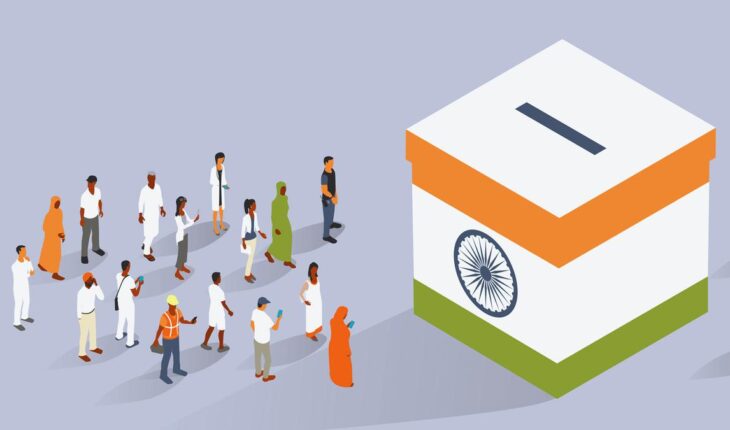The year 2024 marked a pivotal moment in India’s political history as the nation witnessed one of its most consequential elections. Against a backdrop of evolving socio-economic challenges, shifting demographics, and heightened political consciousnes s, the 2024 Indian elections unfolded as a spectacle of democratic fervor. This article provides a comprehensive analysis of the election dynamics, exploring the emergence of new political players, the realignment of alliances, and the diverse aspirations of the Indian electorate.
Emergence of New Political Players: One of the defining features of the 2024 elections was the rise of new political players on the national stage. Regional parties, rooted in local issues and identities, gained significant traction, challenging the dominance of traditional political heavyweights. These parties capitalized on grassroots support and leveraged social media and other platforms to amplify their message. The emergence of these new players added a layer of complexity to the political landscape, introducing fresh perspectives and diversifying the electoral discourse.
Shifting Alliances and Coalition Politics: The 2024 elections also witnessed a reshuffling of political alliances, as parties sought to forge strategic partnerships to maximize their electoral prospects. Traditional alliances were tested, and unexpected coalitions emerged as parties sought to expand their voter base and secure a path to power. The fluid nature of coalition politics added an element of uncertainty to the electoral calculus, as parties engaged in intense negotiations and backroom maneuvering to cobble together winning combinations.
Key Issues and Voter Aspirations: Against the backdrop of economic uncertainty, social inequality, environmental degradation, and national security concerns, voters entered the polling booths with a diverse set of aspirations and priorities. Economic development, job creation, healthcare, education, and infrastructure were among the top issues driving voter sentiment. Additionally, issues such as social justice, gender equality, and environmental sustainability resonated strongly with segments of the electorate, reflecting the evolving priorities of Indian society.
Campaign Strategies and Mobilization Efforts: The campaign season leading up to the elections was marked by frenetic activity as political parties pulled out all the stops to woo voters. Candidates crisscrossed the country, holding rallies, roadshows, and town hall meetings to connect with voters. Social media emerged as a potent tool for political communication, with parties leveraging digital platforms to reach millions of voters and disseminate their message. Ground-level mobilization efforts, including door-to-door canvassing, grassroots outreach programs, and targeted messaging, played a crucial role in shaping voter perceptions and turnout.
The Role of Technology and Media : Technology played an unprecedented role in shaping the narrative of the 2024 elections. Social media platforms became battlegrounds for political discourse, with parties engaging in aggressive campaigning, disinformation campaigns, and online mobilization efforts. Data analytics and targeted advertising allowed parties to micro-target specific demographics and tailor their messaging accordingly. Additionally, the role of traditional media outlets, including television, newspapers, and radio, remained influential in shaping public opinion and framing the electoral narrative.
Challenges and Controversies: Despite the democratic fervor surrounding the elections, they were not without challenges and controversies. Allegations of electoral malpractice, voter suppression, and manipulation of social media platforms marred the electoral process. Instances of hate speech, communal polarization, and identity politics further heightened tensions, raising concerns about the integrity of the electoral process and the health of Indian democracy. Additionally, logistical challenges, including voter registration issues, polling irregularities, and security concerns, posed logistical hurdles for election authorities.
The Aftermath and Governance Challenges As the dust settled and the results were announced, India woke up to a new political reality. The elections had ushered in a new era of coalition politics, with parties scrambling to negotiate power-sharing arrangements and stake their claim to government formation. The task of governance fell squarely on the shoulders of the newly elected leadership, who faced the formidable challenge of addressing the myriad socio-economic issues facing the nation. Balancing competing interests, delivering on campaign promises, and navigating the complexities of coalition politics would require skillful leadership, effective governance, and a commitment to inclusive development.
The 2024 Indian elections were a watershed moment in the country’s democratic journey, characterized by the emergence of new political players, shifting alliances, and diverse voter aspirations. Against a backdrop of socio-economic challenges and heightened political consciousness, the elections underscored the vibrancy and dynamism of Indian democracy. As India charted its course forward, the onus fell on its elected leaders to translate electoral mandates into meaningful governance, driving progress, and prosperity for all segments of society






